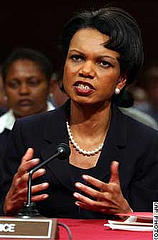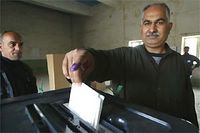Monday, January 31, 2005
Saturday, January 29, 2005
Iraq: Democracy or Chaos?
Opinion by R. David Brown
Like many in the anti-war camp, I am torn between feelings of great optimism and worry for the people of Iraq. On the eve of elections, the latest news could not be worse: multiple suicide bombers, attacks against polling stations, Iraqi civilians found executed, U.S. forces under heavy arms fire, another helicopter crash, and multi-media threats against those participating in the tomorrows vote - hardly a reassuring setting for an emerging democracy.
Obvious that the Bush administration is paying attention to recent polls, the bar has been lowered to a level where any turnout whatsoever will be considered a monumental victory. With Sunni Muslim extremists threatening to "wash the streets in blood", many people have more at stake than simply electing a transitional national assembly.
Regardless of turnout, the Shiite majority will certainly prevail. What this means for the future of Iraq is still unclear. Recent restraint by Shiite clerics, including the highly influential Grand Ayatollah Ali al-Sistani, and their pledge not to directly participate in government is promising. The big question is how the Sunni minority, including the extremist element, will deal with the power shift.
The latest poll numbers indicate that up to 80% of Iraqis want U.S. forces to withdraw from their country. This might offer the administration an acceptable "out" after the true elections in December, which according to many insiders is exactly what they are looking for.
My fear is that whatever the course, the violence will continue to escalate and if that violence includes the targeting of newly elected assembly members, chaos will ensue. With the U.S. military's current inability to secure the major population centers, added stress could result in further disintegration of the society at large.
At best, there is an equal chance of moderate violence (of the current variety) or a collapse into chaos. It is my sincere hope that the planned level of inclusiveness in government, including the one-third allotted to women, will actually help tame the violence and foster a spirit of compromise that has been missing from Iraq for so many years.
Like many in the anti-war camp, I am torn between feelings of great optimism and worry for the people of Iraq. On the eve of elections, the latest news could not be worse: multiple suicide bombers, attacks against polling stations, Iraqi civilians found executed, U.S. forces under heavy arms fire, another helicopter crash, and multi-media threats against those participating in the tomorrows vote - hardly a reassuring setting for an emerging democracy.
Obvious that the Bush administration is paying attention to recent polls, the bar has been lowered to a level where any turnout whatsoever will be considered a monumental victory. With Sunni Muslim extremists threatening to "wash the streets in blood", many people have more at stake than simply electing a transitional national assembly.
Regardless of turnout, the Shiite majority will certainly prevail. What this means for the future of Iraq is still unclear. Recent restraint by Shiite clerics, including the highly influential Grand Ayatollah Ali al-Sistani, and their pledge not to directly participate in government is promising. The big question is how the Sunni minority, including the extremist element, will deal with the power shift.
The latest poll numbers indicate that up to 80% of Iraqis want U.S. forces to withdraw from their country. This might offer the administration an acceptable "out" after the true elections in December, which according to many insiders is exactly what they are looking for.
My fear is that whatever the course, the violence will continue to escalate and if that violence includes the targeting of newly elected assembly members, chaos will ensue. With the U.S. military's current inability to secure the major population centers, added stress could result in further disintegration of the society at large.
At best, there is an equal chance of moderate violence (of the current variety) or a collapse into chaos. It is my sincere hope that the planned level of inclusiveness in government, including the one-third allotted to women, will actually help tame the violence and foster a spirit of compromise that has been missing from Iraq for so many years.
Tuesday, January 25, 2005
$80 Billion More For War
By R. David Brown
George W. Bush plans to ask Congress for an additional $80 billion for the war in Iraq and Afghanistan. This amount is in addition to the $25 billion already approved earlier this year, bringing the total "emergency" spending to an incredible $105 billion. Keep in mind, this does not include the Department of Defense 2005 annual budget of over $400 billion.
While this additional amount will surely be approved by Congress, at what point do our elected officials set aside reelection concerns and fears of being branded "un-American" or as not supporting the troops, and begin to turn a critical eye to this massive spending? Total spent on war - after the $80 billion approval- will top $280 billion! If only this administration applied as much zeal toward the more pressing domestic issues facing this country.
For perspective, consider the projected deficit, national debt, trade deficit (with some of our biggest partners), the pitiful state of our healthcare system, underemployment and outsourcing.
George W. Bush plans to ask Congress for an additional $80 billion for the war in Iraq and Afghanistan. This amount is in addition to the $25 billion already approved earlier this year, bringing the total "emergency" spending to an incredible $105 billion. Keep in mind, this does not include the Department of Defense 2005 annual budget of over $400 billion.
While this additional amount will surely be approved by Congress, at what point do our elected officials set aside reelection concerns and fears of being branded "un-American" or as not supporting the troops, and begin to turn a critical eye to this massive spending? Total spent on war - after the $80 billion approval- will top $280 billion! If only this administration applied as much zeal toward the more pressing domestic issues facing this country.
For perspective, consider the projected deficit, national debt, trade deficit (with some of our biggest partners), the pitiful state of our healthcare system, underemployment and outsourcing.
Wednesday, January 19, 2005
Rice Endorsed by Senate Panel to Be Next Secretary of State
By David Stout, NY Times
*news link as follow-up to previous post
*news link as follow-up to previous post
Tuesday, January 18, 2005
Condoleezza Rice Senate Confirmation
Opinion by R. David Brown

AP Photo
By way of preface, I must state that I was (and still am) very critical of the war in Iraq and also the vacillating justifications used in the build up to war. While most objective observers agree that Iraq was in no way a threat to the territory or population of the United States, it is an obvious fact that Mr. Hussein was indeed a despot and guilty of countless human rights violations.
What surprised me most about the Bush administrations case for war was the level of jingoistic and repetitive language used to build the portrait of Hussein as the Beast of Baghdad and the warnings of the pervasiveness of WMD, which later evolved into an "intent" to pursue weapons programs. Even after many of the administration's claims have been discredited, there continues to be variations of the same tune played to the American public - believing that if the tune is played often enough others will start to hum the lyrics.
This tactic has been the mantra of Condoleeza Rice during testimony and political chat over the past few years and is currently her forward position in the Senate hearing for her confirmation as Secretary of State. Her testimony today before the Senate Foreign Relations Committee has been little more than a reprise of statements regarding the administration's various positions and rationale for the Iraq war, with a bit of discussion of other geo-political hotspots. With the exception of Senator Barbara Boxer (Dem-CA), most questions have been neither critical nor probing. This may be in part the result of a generally dispassionate attitude of most senators, considering the confirmation to be simply a formality.
To many, the issue of accountability on the war with Iraq was resolved with the reelection of George W. Bush. It still remains the duty of the committee to honestly and thoroughly examine the character, record and vision of the nation's highest diplomatic post.
*The confirmation hearing continues tomorrow morning.

AP Photo
By way of preface, I must state that I was (and still am) very critical of the war in Iraq and also the vacillating justifications used in the build up to war. While most objective observers agree that Iraq was in no way a threat to the territory or population of the United States, it is an obvious fact that Mr. Hussein was indeed a despot and guilty of countless human rights violations.
What surprised me most about the Bush administrations case for war was the level of jingoistic and repetitive language used to build the portrait of Hussein as the Beast of Baghdad and the warnings of the pervasiveness of WMD, which later evolved into an "intent" to pursue weapons programs. Even after many of the administration's claims have been discredited, there continues to be variations of the same tune played to the American public - believing that if the tune is played often enough others will start to hum the lyrics.
This tactic has been the mantra of Condoleeza Rice during testimony and political chat over the past few years and is currently her forward position in the Senate hearing for her confirmation as Secretary of State. Her testimony today before the Senate Foreign Relations Committee has been little more than a reprise of statements regarding the administration's various positions and rationale for the Iraq war, with a bit of discussion of other geo-political hotspots. With the exception of Senator Barbara Boxer (Dem-CA), most questions have been neither critical nor probing. This may be in part the result of a generally dispassionate attitude of most senators, considering the confirmation to be simply a formality.
To many, the issue of accountability on the war with Iraq was resolved with the reelection of George W. Bush. It still remains the duty of the committee to honestly and thoroughly examine the character, record and vision of the nation's highest diplomatic post.
*The confirmation hearing continues tomorrow morning.
Friday, January 14, 2005
Welcome to Political Zen
Political Zen is a new blog created to offer an alternative to the ubiquitous cyber-punditry and the destructive, though entertaining, partisan rant that has consumed both cyber and traditional broadcast media. While we reserve the right to engage in the occasional rant, our goal is to foster a more reflective and reasoned approach to the analysis of politics and contemporary culture.
In the spirit of inclusiveness, we will refrain from posting articles that have an overly "academic" tone or appeal to a relatively small subset of the population. Our goal is to be informative without being too didactic.
In the spirit of inclusiveness, we will refrain from posting articles that have an overly "academic" tone or appeal to a relatively small subset of the population. Our goal is to be informative without being too didactic.
Not wanting to limit ourselves too much, we have created a fairly broad area of interest in politics and culture - in this we hope to further develop the site along the lines of political and economic philosophy, with a bit of religious discussion on the side. It might sound somewhat disconnected, but the nexus will become apparent as the site evolves.
We welcome your comments and suggestions and hope you enjoy the blog!






